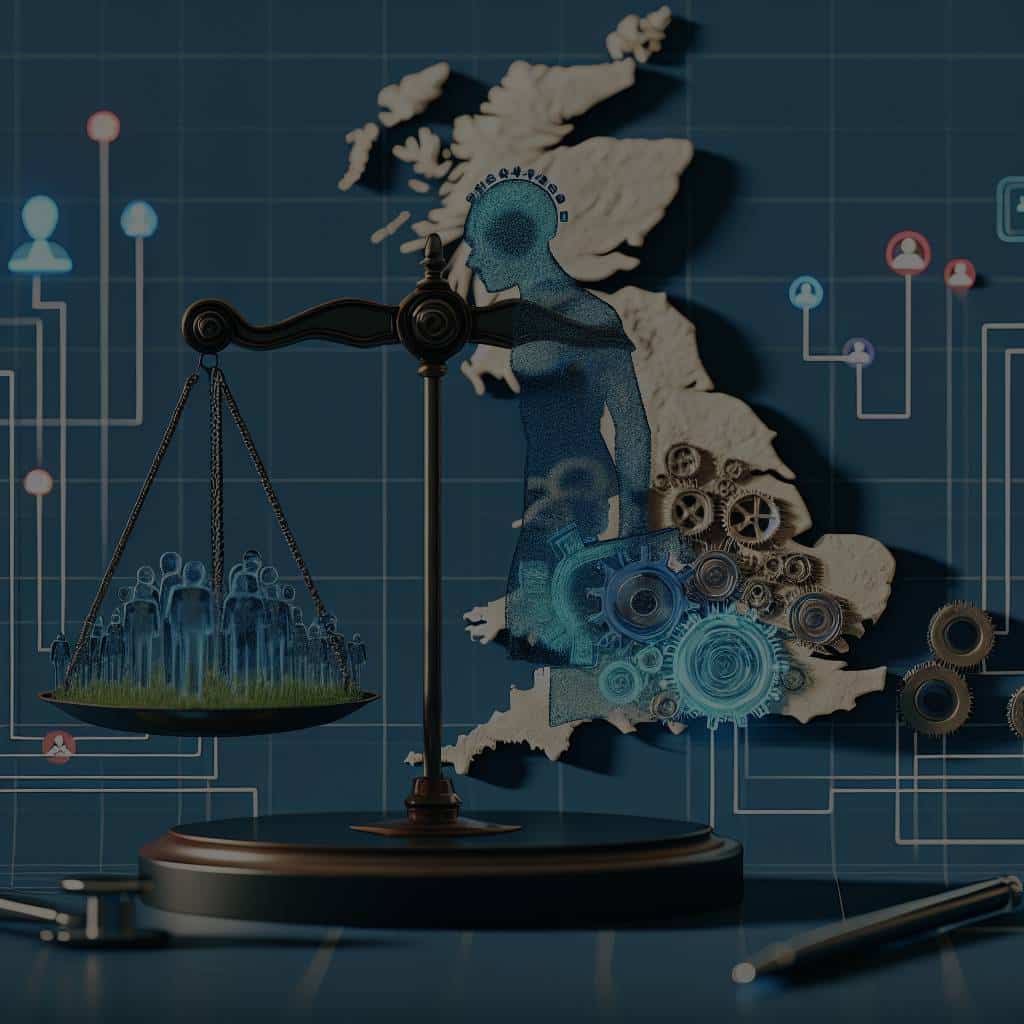What Are the Legal and Ethical Considerations of AI in UK Recruitment?

In this age of digital transformation, artificial intelligence (AI) is reshaping the recruitment landscape. It is a game-changer, introducing efficiencies into a traditionally laborious process. However, as you harness the power of technology, it’s essential to consider whether your AI-based recruitment systems are both legal and ethical. This article will delve into the issues surrounding data privacy, bias and discrimination, and the law in the context of AI-driven recruitment efforts in the UK.
Understanding the Intersection of AI and Recruitment
Before we delve into the gritty details, let’s first understand the dynamics at play. Artificial intelligence has redefined the recruitment process, making it faster, more efficient, and seemingly more objective. However, each time you use an AI-based system to shortlist candidates for a job, you’re dealing with human data – and that brings ethical and legal obligations.
Also read : Optimise load security with advanced packaging machinery solutions
AI-based recruitment systems use algorithms to sort and rank candidates based on specific parameters, usually derived from job descriptions. These systems can sift through thousands of applications, ensuring that only the most relevant ones reach the human recruiters. It’s like having a robot assistant who can work 24/7, cutting down the time and cost of hiring significantly. But in doing so, it’s also processing vast amounts of personal data, and herein lies the crux of the matter.
Exploring Data Privacy and AI in Recruitment
Data privacy is at the forefront of concerns when dealing with AI systems. These systems require large amounts of data to train and validate their models. As a potential employer, it’s your responsibility to ensure that the candidates’ personal data is handled in an ethical and legal manner.
Also read : How Can UK Event Planners Use Virtual Reality for Enhanced Experiences?
UK law requires businesses to adhere to the General Data Protection Regulation (GDPR), which mandates explicit consent from individuals before their data can be used. In the context of recruitment, this means you need to inform candidates that an AI system will be processing their data and obtain their explicit consent.
Moreover, the right to be forgotten is a key aspect of GDPR. This means that if a candidate requests that their data be deleted, you are legally obliged to do so from your systems. Thus, it’s critical to ensure that your AI-based recruitment system has this capability.
Navigating Bias and Discrimination in AI-based Recruitment
Another significant concern is the potential for bias and discrimination in AI-powered hiring. AI systems are only as good as the data they’re trained on. If the underlying data reflects societal biases, these could be inadvertently reinforced by the technology, leading to unfair hiring practices.
In the UK, the Equality Act 2010 prohibits discrimination in hiring based on protected characteristics such as age, sex, race, religion, or disability. Therefore, it’s crucial to ensure that your AI-based recruitment system does not discriminate, even inadvertently, against any candidate.
To mitigate bias, you should regularly audit your AI system to identify any discriminatory patterns. This might involve examining the data the system uses for decision-making or the way the algorithm weights certain factors. Regular audits can help ensure that your hiring process remains fair and unbiased, in line with UK law and ethical considerations.
Understanding Legal Regulations on AI in Recruitment
Legal regulations are pivotal in governing the use of AI in recruitment. In the UK, several laws and directives touch on this, including the GDPR and the Data Protection Act 2018. These laws mandate how personal data can be collected, stored, and processed.
In addition, as already noted, the UK Equality Act 2010 stipulates that job candidates shouldn’t be discriminated against based on protected characteristics. This law applies to all stages of recruitment, including when using AI-based systems for shortlisting.
The Information Commissioner’s Office (ICO) in the UK has also issued guidelines on the use of AI in decision-making. The ICO recommends that businesses conduct a Data Protection Impact Assessment (DPIA) before deploying any AI system. A DPIA can help you assess and mitigate the risks to data privacy posed by your AI-based recruitment system.
Embracing Ethical Recruitment Practices with AI
While laws provide a baseline for what’s permissible, ethics guide us on what’s right. Ethical considerations in AI-based recruitment revolve around fairness, transparency, and respect for candidates’ dignity.
Transparency is essential. Candidates should know when AI is being used in the recruitment process, and on what basis decisions are being made. You should also provide candidates a chance to challenge the outcome if they believe the decision was unfair.
Moreover, the use of AI should never compromise a candidate’s dignity. AI systems should respect the rights and values of candidates, making a hiring process that is not only efficient but also fair, respectful, and ethical.
AI promises great potential in shaping the future of recruitment. By understanding and navigating the legal and ethical considerations of AI in recruitment, you can harness technology’s power while ensuring a fair, efficient, and respectful hiring process.
Video Interviewing and AI: Ethical and Legal Implications
With the advent of advanced technology, video interviewing is becoming more commonplace in the recruitment process. This shift to digital interaction brings its own ethical and legal considerations, particularly when incorporating AI.
One of the most prevalent uses of AI in video interviewing is facial recognition technology. This tool can analyse a candidate’s facial expressions, body language and speech patterns in real-time, potentially offering insights into their suitability for a role. However, the use of this technology poses serious questions about data privacy and consent.
Under GDPR and the Data Protection Act 2018, explicit consent is necessary before collecting and processing personal data. In the context of video interviewing, this implies that candidates must be informed about the use of AI and facial recognition technology in their interview process. They should understand its purpose and how their data will be used and stored. It’s also crucial to provide clear information on how candidates can withdraw their consent and request deletion of their data.
In terms of ethical considerations, the use of facial recognition in video interviewing can potentially infringe upon a candidate’s privacy and dignity. Evaluating a candidate’s suitability based on facial expressions or body language may lead to skewed decision-making, as these elements can be influenced by a myriad of factors unrelated to job performance. Furthermore, it is paramount to consider that people with certain disabilities may not be able to convey expressions or body language in the typical sense, leading to potential discrimination.
Legal Compliance and Ethical Recruitment with AI
As the use of AI in recruitment increases, it’s crucial for organisations to stay up-to-date with legal compliance and to invest in ethical recruitment practices.
The legal profession in the UK has laid out clear guidelines for using AI in recruitment. Not only must organisations adhere to data protection regulations like the GDPR and the Data Protection Act 2018, but they also need to comply with the Equality Act 2010, which prohibits discrimination based on protected characteristics.
To ensure legal compliance, regular audits of AI systems should be conducted. This includes scrutinising the data sets used for training the AI and assessing the weightage given to various factors in the decision-making process. Conducting a Data Protection Impact Assessment (DPIA), as recommended by the Information Commissioner’s Office (ICO), can also help identify any potential risks to data privacy.
In terms of ethical recruitment, transparency is key. Candidates should be fully informed about how their personal data will be used and how decisions about their candidacy will be made. Organisations can also offer candidates the chance to challenge the outcomes of the recruitment process, providing a safeguard against potential unfair or biased decision-making.
Moreover, the human rights of candidates should never be compromised by the use of AI. AI systems should respect the rights and values of candidates, contributing to a recruitment process that is not only efficient, but also fair, respectful, and ethical.
Conclusion
Navigating the legal and ethical considerations of AI in UK recruitment can seem daunting. However, with careful planning, regular audits, and a commitment to transparency, organisations can leverage the power of AI to transform their recruitment processes.
Remember, while AI can offer efficiencies and cost savings, it should never compromise on the respect and dignity of candidates. The use of AI should adhere to all necessary data protection regulations and promote fair and unbiased recruitment practices. By doing so, organisations can harness the power of AI, while ensuring a recruitment process that is ethical, legal, and respectful of candidates’ human rights.
